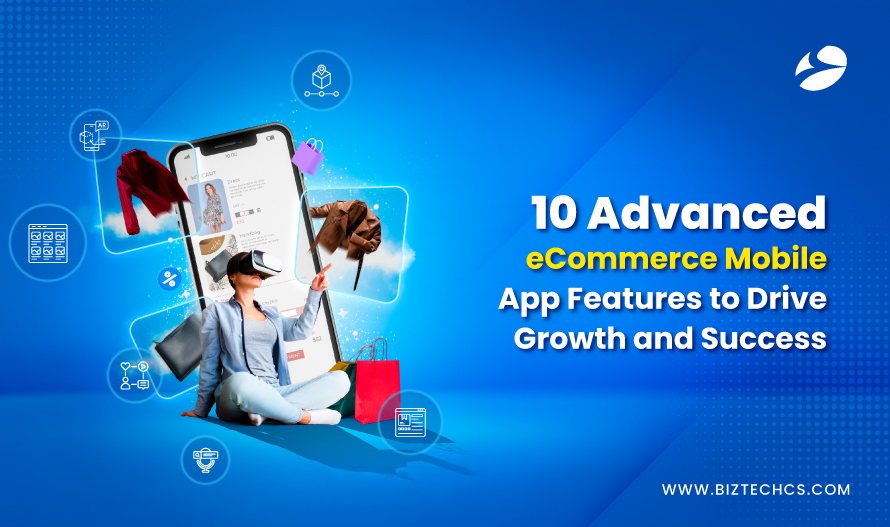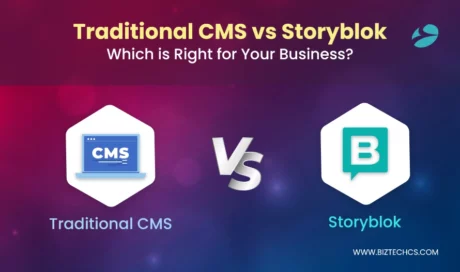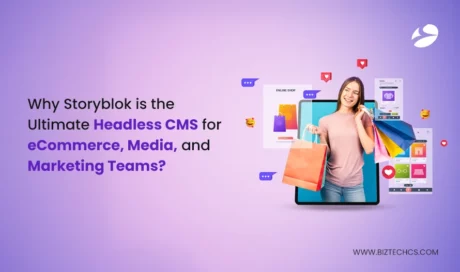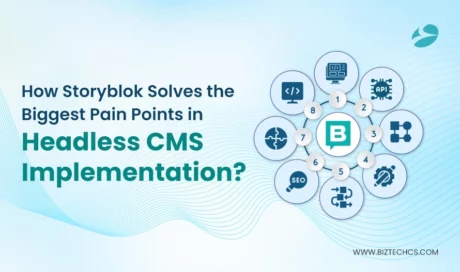758
10 Advanced eCommerce Mobile App Features to Drive Growth and Success
10 Feb, 2025
7 min read
758
10 Feb, 2025
7 min read
Table Of Content

A few seconds—that’s all it takes for a shopper to decide whether to stay on an app or leave. A smooth and interesting eCommerce mobile application is essential for keeping clients in the fast-paced digital world of today.
By investing in eCommerce mobile app development, companies may provide individualized experiences, quick checkout times, and seamless navigation.
In addition to improving usability, the correct eCommerce application features increase conversions and foster brand loyalty. The future of online shopping is being shaped by innovation, from voice search to AI-powered suggestions.
Businesses that adopt these innovations get a big competitive advantage. Learn about ten innovative features in this blog that can help eCommerce succeed.
The process of developing mobile applications that let companies sell goods and services online is known as eCommerce app development.
The main goals of a well-designed eCommerce mobile app development project are smooth operation, safe transactions, and easy navigation.
Personalized recommendations, real-time order tracking, numerous payment choices, and user-friendly product catalogs are all crucial eCommerce application features. These characteristics improve client satisfaction and increase interaction.
Companies spend money on eCommerce mobile app solutions to increase online sales and reach a wider audience. A successful software guarantees seamless operation, security, and expandability to satisfy expanding user needs.
Customers can buy things with the Buy-Now-Pay-Later (BNPL) option without having to pay the entire price upfront. It provides flexible payment options, which improves the buying experience.
Conversion rates are increased by this functionality in eCommerce mobile applications, particularly for expensive products. Customers feel more comfortable purchasing installment choices, lowering cart abandonment.
Developing eCommerce mobile apps with BNPL integration increases customer retention and draws in cost-conscious buyers.
Businesses can use smart TVs and streaming services to target potential clients with connected TV (CTV) advertising. It makes it possible to offer users who interact with digital content highly targeted promotions.
This functionality in an eCommerce mobile application increases brand visibility by showing advertisements to the appropriate audience at the appropriate moment.
It allows businesses to track ad performance and optimize marketing campaigns. With eCommerce mobile app development, integrating CTV ads can drive traffic and improve sales.
The front-end and back-end of an eCommerce mobile application are separated via headless commerce. Offering individualized purchasing experiences across several platforms is made flexible with this strategy.
Companies can design unique user interfaces while guaranteeing smooth backend system integration. It enables quicker updates and trend adaptation without interfering with essential operations.
Performance and scalability are enhanced when headless commerce is incorporated into eCommerce mobile app development.
Detailed product descriptions give consumers all the information they need to make an informed decision. Clear features, advantages, and usage guidelines should all be included in an eCommerce mobile application.
Well-written descriptions lower return rates by assisting customers in making knowledgeable judgments. High-quality content increases discoverability and raises the app’s search rankings.
eCommerce mobile app development must focus on presenting accurate, engaging descriptions to build trust and boost conversions.
By enabling consumers to see products in actual environments, augmented reality technologies improve the shopping experience. Fashion, furniture, and cosmetics are among the industries that benefit from this feature in an eCommerce mobile application.
Customers can reduce uncertainty by previewing how an item fits or looks before purchasing. By providing a realistic perspective of products, augmented reality technology increases engagement and decreases return rates.
Companies that engage in AR-enabled eCommerce mobile app development may produce engaging and dynamic shopping experiences.
Customers can get immediate updates on their orders with real-time shipping status. By providing precise tracking and predicted delivery times it improves the user experience.
This function in an e-commerce mobile application decreases client inquiries about shipments while fostering confidence.
Notifications and live updates keep shoppers informed throughout the delivery process.
eCommerce mobile app development with real-time tracking ensures transparency and improves customer satisfaction.
A well-organized product gallery improves an eCommerce mobile application’s visual attractiveness. High-quality photos and videos enable customers to closely inspect things before purchasing.
360-degree views, zoom capabilities, and several angles increase confidence and engagement. Purchase decisions are influenced, and hesitancy is decreased with an engaging product gallery.
To improve the purchasing experience, visual content optimization must be the main focus of eCommerce mobile app development.
Users can use this function to see if a product is available at local warehouses or retailers. Customers can use it to decide what to buy based on supply levels quickly. Convenience is increased with an eCommerce mobile application that tracks inventory depending on location. It promotes in-store visits and lessens the disappointment brought on by out-of-stock items.
It reduces disappointment caused by out-of-stock items and encourages in-store visits. eCommerce mobile app development with this functionality enhances user satisfaction and improves sales efficiency.
An eCommerce mobile application’s social media integration enables easy sharing and login features. For speedy sign-ins and tailored suggestions, users can link their social media accounts.
By facilitating direct product sharing on social media sites like Facebook and Instagram, this tool aids companies in increasing interaction. Through social network links, customers can make straight purchases thanks to integrated social commerce alternatives.
Developing eCommerce mobile apps with social media integration improves consumer engagement and brand exposure.
An eCommerce mobile application’s accessibility and convenience are enhanced by voice and visual search. Instead of typing keywords, users can upload images or speak to find products.
This function speeds up search procedures and enhances the user experience. Based on user input, AI-powered recognition technology aids in producing precise results.
Businesses investing in eCommerce mobile app development with voice and visual search ensure a modern and efficient shopping journey.
The first step in selecting the best eCommerce application features is establishing your business goals. The app should address a specific issue, such as increasing shopping convenience or decreasing cart abandonment.
Knowing your target market helps you shape the functionality and user experience of the app. It’s crucial to ascertain what unique value the eCommerce mobile application offers compared to competitors.
A clearly defined business goal guarantees the app will meet customer expectations and succeed in the long run.
Users’ needs should guide the creation of eCommerce mobile apps. Understanding the gaps in current solutions is aided by conducting competitor and market research. Surveys and feedback can teach potential users’ expectations and pain areas.
Leveraging eCommerce Development Services can further enhance the app’s functionality, ensuring it meets market demands effectively. The app will stand out from the competitors if its Unique Selling Proposition (USP) is clearly defined.
Putting user needs first guarantees that the eCommerce mobile app offers significant value.
According to the 80/20 rule, a limited number of eCommerce software functionalities will produce the most impact. Prioritizing essential features like secure checkout, payment choices, and product catalogs is a good idea.
These features save development expenses while enhancing user experience. Businesses can launch more quickly if they avoid needless complexity in the early stages.
A focused approach ensures that the core functionality of the eCommerce application features remains strong.
Setting priorities aids in effectively organizing the development process. Features essential to any eCommerce app, such as product listings, search, and checkout, cannot be compromised. Push notifications are an example of an essential but non-essential “should-have.”
Secondary features like wishlist functionality fall into the “could-have” category. The eCommerce mobile application can be improved over time with planned future additions like AI-based recommendations.
When developing eCommerce mobile apps, a lean methodology helps to prevent overcomplication. Faster market entry is ensured by launching with a small set of basic functionalities. Businesses can make incremental improvements to the app by gathering actual user input.
Analytics tools facilitate data-driven improvements and user behavior tracking. The eCommerce mobile app is always being improved to make it more competitive and user-friendly.
One crucial factor to take into account while choosing the technological stack is scalability. Selecting frameworks like Flutter or React Native guarantees adaptability for the next updates. Integration with marketing, analytics, and CRM technologies should be designed from the start.
An eCommerce mobile application with a solid structure can expand with the company without experiencing performance problems. Scalability planning guarantees that the functionalities of the eCommerce application change in response to user needs.
Usability testing aids in improving the app experience before launch. A clear picture of the finished product can be obtained by using tools such as Figma to create a wireframe or interactive prototype. Usability testing guarantees that the functionalities of the eCommerce software live up to user expectations.
Revisions later on are less expensive when input is addressed before development. A well-tested mobile app for eCommerce stands a better chance of success in a competitive market.
Creating a good eCommerce mobile app is essential for companies hoping to succeed in the digital market.
Convenience, quicker checkout times, and a flawless purchasing experience are all provided by a well-designed eCommerce mobile app. Consumers anticipate cutting-edge eCommerce application features like real-time tracking, safe payments, and AI-driven suggestions.
Businesses risk losing clients to rivals with superior eCommerce app features if they don’t have these.
Developing high-performing eCommerce mobile applications that meet company goals is our area of expertise at BiztechCS. Our skilled developers guarantee scalable architecture, appealing UI/UX, and seamless navigation.
We incorporate key features of eCommerce apps, such as multilingual support, push notifications, and customized shopping. Businesses can increase conversions and establish a strong mobile presence with our help.
At last, incorporating advanced eCommerce app features is now essential for companies hoping to achieve long-term success. These improvements, which range from AI-powered suggestions to smooth checkout processes, are what make a modern eCommerce mobile application successful.
Better engagement, more conversions, and enduring client loyalty are guaranteed when you invest in creating an eCommerce mobile app that meets changing consumer expectations. Additionally, understanding eCommerce mobile app development cost is crucial for businesses looking to allocate resources effectively while ensuring their app remains competitive and feature-rich.
Companies prioritizing state-of-the-art eCommerce application features will maintain their lead in the fiercely competitive digital market.
Long-term success and new chances can only be achieved with an eCommerce mobile app that is prepared for the future.
Our dedicated Shopify developers have deep expertise in building high-performing eCommerce stores tailored to your business needs. We ensure seamless integrations, custom features, and optimized performance for better conversions.
The cost depends on factors like app complexity, features, platform (iOS, Android, or both), and development time. A basic app may cost a few thousand dollars, while a feature-rich solution can go much higher.
Yes, we can revamp your eCommerce app to improve design, user experience, and performance. We analyze your current app, identify gaps, and implement the necessary enhancements.
Start by defining your goals, choosing a platform, and finalizing key features. Then, work with experienced developers to design, develop, test, and launch the app.
Poor UI/UX design, slow performance, and complex navigation can drive users away. Ignoring security, mobile responsiveness, and smooth checkout can also hurt conversions.
An eCommerce app provides better customer engagement, higher retention, and seamless shopping experiences. It helps boost sales by offering convenience, personalization, and faster transactions.

Storyblok
23282
By Devik Gondaliya
02 Apr, 2025

Storyblok
24257
By Devik Gondaliya
01 Apr, 2025

Storyblok
24992
By Devik Gondaliya
27 Mar, 2025